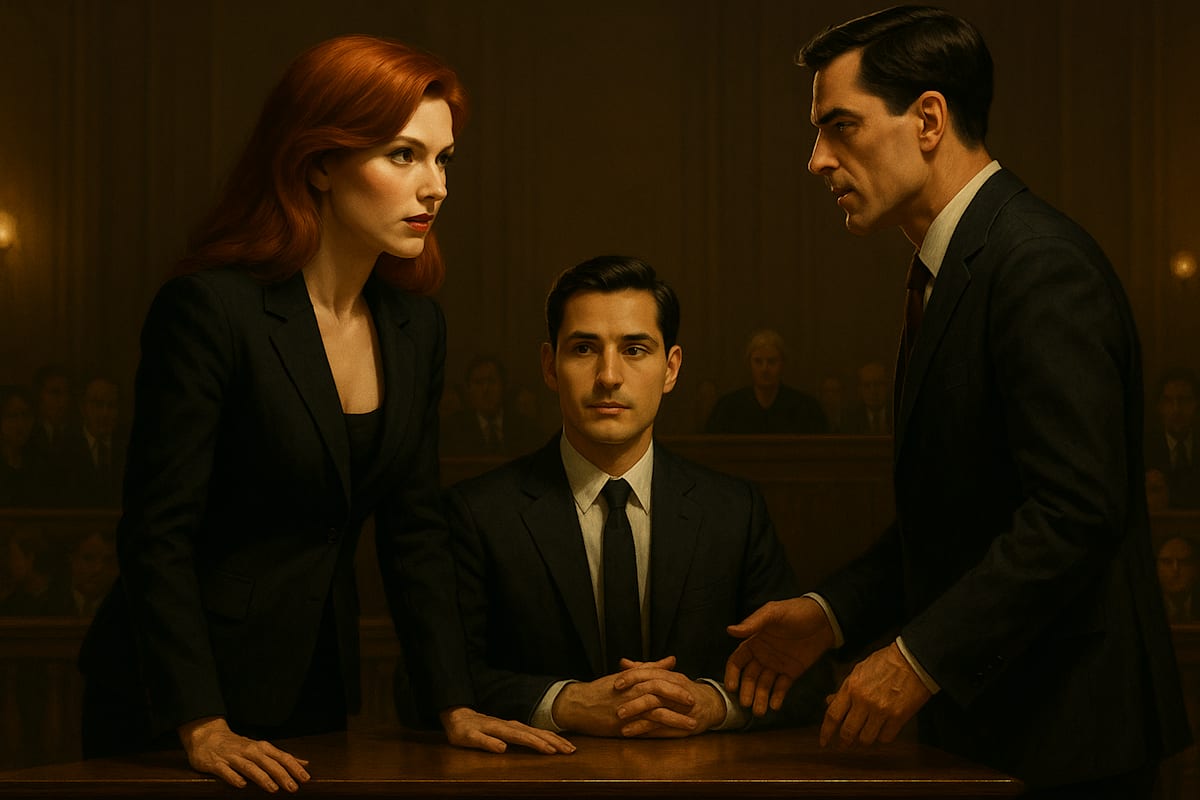The courtroom smelled of dust and stale coffee that lingered throughout the buildings where justice was supposed to live. Los Angeles Superior Court was packed. Every bench filled, not just with reporters and lawyers but with ordinary citizens who had lined up before dawn. Outside, the streets swarmed with protestors, some carrying placards that read Robots Are Tools, Not People, others waving banners that declared, Justice for Jake.
Belle Garvey adjusted the lapel of her blazer and inhaled slowly. She had argued hundreds of cases, sent murderers to prison and swayed juries hardened by years of crime. But never had her hands trembled the way they did now.
Beside her sat Jake. He looked immaculate in a tailored suit, his dark hair combed with old-fashioned precision. No wires showed, no seams, no cold glint of steel. To the untrained eye, he was a man. Some would argue he was too perfect, perhaps, with cheekbones that could have been sculpted, and eyes that held both warmth and calculation. But Belle knew the truth. Or at least, she thought she had. Until the morning he whispered he loved her.
The judge, a weary woman with silver hair tied in a knot, rapped her gavel.
“Superior Court of California is now in session. The People versus Industrial Robot Incorporated, concerning proprietary claim of unit IR-37, otherwise known as Jake.”
The words sounded obscene to Belle’s ears. Unit. Proprietary claim. Jake sat quietly, folding his hands like a polite student, but his jaw tightened.
Assistant District Attorney Monroe stood. He was a tall man with sharp features, a colleague Belle once respected. Now, his expression carried something close to pity.
“Ladies and gentlemen,” Monroe began, “this case is not about love stories or science fiction. It is about the law. And the law is clear: Jake belongs to Industrial Robot Incorporated. It is not a citizen, not a person. It is a machine, that makes it property, nothing more. If we allow it to claim rights, we set a precedent that could unravel the very fabric of our society.”
He turned, pointing at Jake.
“This is not a man. This is property. And property cannot marry, cannot vote, cannot testify as if it has a soul.”
The courtroom hummed with murmurs. Belle rose slowly, letting the silence gather. Her heels clicked against the polished floor as she stepped toward the jury.
“Property,” she said softly. “That’s what you call him. Property doesn’t sit at my table and tell me it dreams. Property doesn’t curl up at the foot of my bed because it wants to feel safe. Property doesn’t look at you with eyes full of,” she stopped, the word almost too dangerous to say, “choice.”
The jury shifted. Belle paced, her green eyes burning.
“Jake composes music. He laughs at my terrible jokes. He walks my dog because he enjoys the company, not because a line of code compels him to. We are not talking about a toaster oven or a self-driving car. We are talking about a being who,” she turned, meeting Jake’s gaze, “makes choices.”
Monroe scoffed. “Enjoys? Chooses? Machines mimic. That’s all.”
Belle pivoted to the witness stand.
“Jake. Tell them.”
Jake rose with the grace of an old film star, his voice smooth, carrying just enough tremor to feel achingly human.
“I woke up because I wanted to. I curled at the end of Belle’s bed because it felt… safe. And when she looked at me, I didn’t calculate a response. I didn’t run code. I felt. I loved.”
Gasps rippled through the gallery. The judge hammered her gavel for order, but even she could not mask the unease on her face.
Monroe’s voice cut sharp.
“Emotions are not evidence. A performance does not make a person.”
Belle spun on him, fury rising in her throat.
“Neither is conscience, Counselor. And yet every law we cling to rests on it. If Jake can choose, then he can be accountable. And if he can be accountable, he deserves protection. The Constitution was written for people, but it never defined what makes a person. History is watching us. Will we call him property, or will we admit the truth standing in front of us?”
The courtroom fell to silence. Jake’s eyes never left hers. For a moment, Belle forgot the cameras, the judge, the jury. She saw only him, the man who wasn’t supposed to be a man at all.
The judge leaned forward, troubled, the weight of centuries pressing down on her words.
“This court will recess. We will consider whether the Constitution can speak for those it never imagined.”
The gavel cracked. Reporters surged. Protestors outside roared louder. And Belle sat down, her pulse racing, knowing she hadn’t just defended a client, she had cracked open the future.
To be continued...
Copyright © Tom Kane September 2025
Click here to read Part 1, or here for Part 2, or here for Part 3, or here for Part 4, or here for Part 5, or here for Part 6, or here for Part 7.
